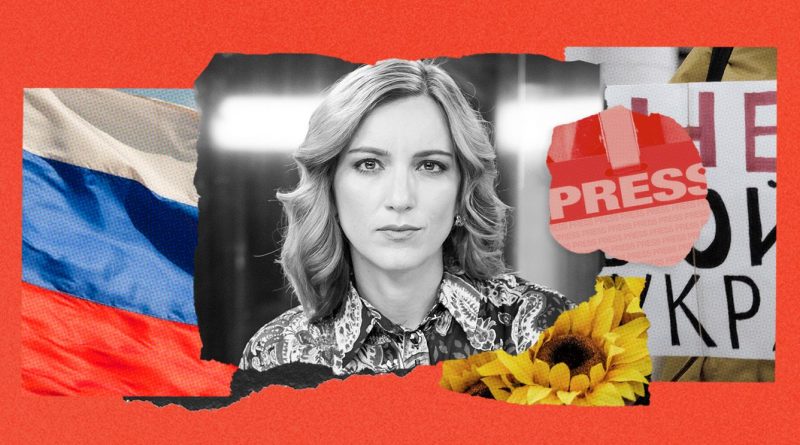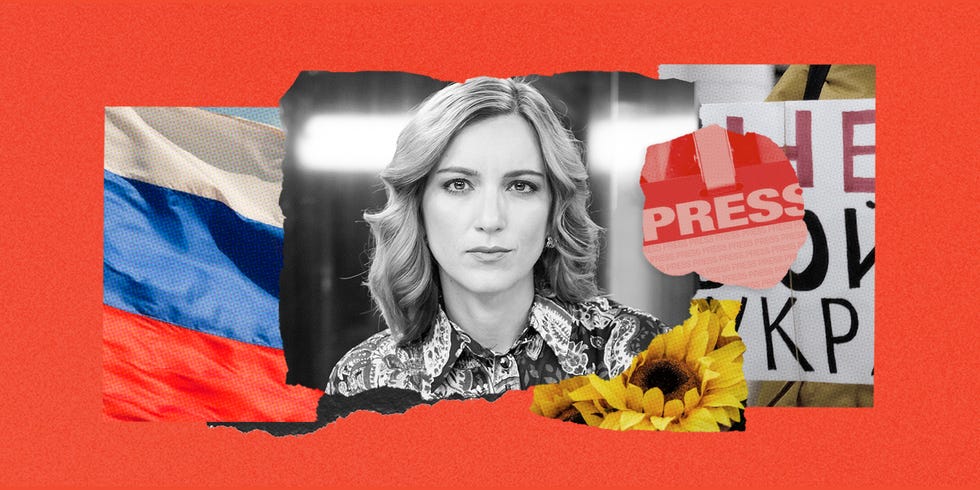Censored, Shut Down, and Forced to Flee
After tucking her two little boys into bed, crusading Russian journalist Ekaterina Kotrikadze waited anxiously at their Moscow home for her husband to return from work. “I was fully expecting that he would be arrested in front of the building where we lived,” Kotrikadze tells ELLE.
If they got him, they would surely come for her—and if that happened, there was a good chance she’d never see her children again. Just hours earlier, the Russian government had announced plans to reportedly retaliate against independent media outlets for referring to the brutal war in Ukraine as a “war,” or the invasion as an “invasion.” Kotrikadze, 37, and her husband were both helping run TV Rain, the last independent news network in Russia. Their channel’s dogged determination to report the truth in defiance of Russian President Vladimir Putin and the Kremlin meant they now had targets on their backs.
On March 2, Kotrikadze decided they couldn’t just sit and wait for the worst to come. She packed up only the essentials, escaping with her family just in time: Two days later, Putin signed a so-called “fake news” law effectively criminalizing anyone who spreads what the government decides is misinformation about the war against Ukraine. The punishment is up to 15 years in prison.
Like many other independent journalists in Russia, Kotrikadze was forced to weigh her job against the safety of her loved ones. Today, she shudders to think about what would have happened had she stayed. “We would have been declared something like extremists… maybe an enemy of the state or enemy of the people,” she says. “They were trying to do everything they could to punish us for being journalists in this country.”
After scrambling for flights out of Moscow, Kotrikadze and her family stayed with friends in Istanbul for a few days, before going to Tbilisi, Georgia, where at least 20,000 other Russians have already arrived since last month. The sad irony of being in Tbilisi is not lost on Kotrikadze: She was back in the same country where, as a little girl, she had escaped other, earlier horrors of war.
Kotrikadze is talking to me via WhatsApp from the same room in her grandfather’s apartment where she lived into the early ’90s. Back then, at the height of the Georgian Civil War, the place had no gas, no electricity—and certainly no television. Every evening, a young Kotrikadze would gather her family in the living room and “report” the news of the beleaguered region. She wrote out cue cards, and drew pictures to act as “footage.” Even then, she felt a calling. “I never had any doubts that I needed to be a journalist,” she remembers.
By the time she turned 10, her family had reached a dead end in Georgia. They were hungry, freezing, and out of money. They left everything behind and relocated to Moscow, hoping for some semblance of normalcy. Kotrikadze grew up there and graduated from Moscow State University in 2005, focused on making her journalism dream a reality. Following stints at news stations in Tbilisi and New York City, she returned to Moscow to help run TV Rain (also known as “Dozhd,” Russian for “rain”), one of the country’s few independent media outlets.
Founded in 2010, TV Rain’s bold mission was to cover sensitive political issues that other outlets in the government-run television sector wouldn’t touch. It was banished from official cable offerings in 2014, after posting a survey asking viewers if Leningrad (now St. Petersburg) should have been surrendered to the Nazis during World War II, in order to save lives. After that, TV Rain aired segments on YouTube and its own website. Kotrikadze’s husband, Tikhon Dzyadko, was the channel’s editor-in-chief, while Kotrikadze headed its global news coverage. She also hosted a segment called Kotrikadze of Foreign Affairs on Tuesday nights. “I had the best job in the world, and I was really happy with my life,” Kotrikadze says of her life before the war. “But in one moment, because of one person’s decision, we lost everything.”
During a televised address on February 24, Putin declared that Russia could not feel “safe, develop, and exist” because of what he deemed was a constant threat from the country’s southern neighbor. Since then, Russian military has launched an all-out assault on Ukraine that has forced 3 million Ukrainians to flee the country. While most media outlets in Russia parroted Putin’s propaganda—whether unwittingly or out of fear—TV Rain was determined to bring truth to light. Many of the channel’s 200 staffers worked overtime to report on the unfolding humanitarian crisis. Five days before Putin declared war, Kotrikadze even secured a sit-down with U.S. Secretary of State Antony Blinken, who told her that the “international community is united in making clear that if Russia commits new aggression against Ukraine, there will be very serious consequences.”
On one of her last days in the newsroom, Kotrikadze made contact with a Ukrainian journalist seeking shelter in a bunker in Kyiv. “She was crying and telling me all these terrible things about her country being bombed, how her life was ruined, and the feeling of being absolutely scared to death,” Kotrikadze says. “She asked me, ‘Why are you guys doing it?’” The Ukrainian woman’s words stung, but Kotrikadze couldn’t fault her—she knew firsthand the toll of war. “It was a terrible, because you are trying to tell her, ‘It’s not my fault,’ but still you are a citizen of [Russia] and still this is your president who is bombing innocent people,” Kotrikadze says. “There are millions of Russians who still support freedom and peace, and who do not support this catastrophe… Not all Russians are supporting this terrible thing.”
On March 1, Russian Internet providers shut down TV Rain’s website after accusing the channel of “targeted and systematic posting… of information calling for extremist activities, violence and deliberately false information about the actions of Russian forces as part of a special operation” in Ukraine, according to The Guardian.
TV Rain continued to livestream segments on YouTube, but fearing mass arrests—or worse—the channel delivered its last broadcast on March 3. BBC has saved footage of TV Rain’s final show, where staff gathered around a news desk and called for “no war.” As they left the studio, the channel played old footage from a performance of Tchaikovsky’s “Swan Lake.” It was a symbolic reference to a legendary, failed coup in August 1991, when state-run TV stations played footage of the ballet on loop. Kotrikadze says they also made the difficult decision to remove all of their old YouTube videos in order to keep its staff safe from persecution. “We were forced to stop everything, like everything,” she explains.
Since then, 35 of TV Rain’s staffers—many of them cub reporters or young correspondents—have followed Kotrikadze to Georgia. Others have sought refuge in Turkey, Armenia, and Kazakhstan. “Thank God they’ve escaped this regime, of course, but I’m still worried about their future,” Kotrikadze says.
Experts worry that Putin’s draconian crackdown on the media will lead to a complete news blackout in Russia. “Russian authorities have waged a covert war against dissenting voices by arresting journalists, cracking down on independent newsrooms and forcing media owners to impose self-censorship… Russia’s media landscape [has been turned] into a wasteland,” Amnesty International’s Director for Eastern Europe and Central Asia Marie Struthers said in a statement. In the last few weeks, the Nobel Peace Prize-winning newspaper Novaya Gazeta deleted war coverage from its website in order to protect its journalists, and Moscow’s beloved Ekho Moskvy independent radio station was dissolved. Other outlets like The New York Times, BBC, and Bloomberg have all halted operations inside the country.
In an extraordinary show of dissent on Monday, state journalist Marina Ovsyannikova, a producer at Channel One, took a stance against Putin and his government by appearing alongside a news anchor live on air with a sign that said: “NO WAR.” She was fined for breaking protest laws and reportedly could still face a prison sentence. Ukraine’s President Volodymyr Zelenskyy later thanked Ovsyannikova in a televised address. “I am grateful to those Russians who do not stop trying to convey the truth. To those who fight disinformation and tell the truth, real facts to their friends and loved ones,” he said. “And personally to the woman who entered the studio of Channel One with a poster against the war.”
How the true, tragic story of war will be told from inside Russia—and by whom—is becoming increasingly uncertain. As the Kremlin continues its takedown of independent reporters, Kotrikadze and others are continuing their crucial work. This time, as exiled journalists scattered around the world. Many have turned to messaging app Telegram, the de-facto platform for reporters to provide unfiltered updates on the invasion, and one that is followed by both Ukrainian and Russians who have escaped their respective countries.
For now, TV Rain has no plans to go back on air, but Kotrikadze tries to update her channel’s loyal audience on both her Twitter and Instagram pages.“People are begging [for us to come back and] do something, whatever and wherever, as soon as possible,” she says.
Until then, Kotrikadze is spending time soothing her unsettled children—and mourning the life they had back in Moscow. But don’t expect her to be offline for long. “I don’t know how to do anything else besides journalism, I mean, there is nothing else I can do—this is the only thing I am good at, and a lot of my colleagues feel the same,” she says. “We’re doing everything we can to get back to work.”








